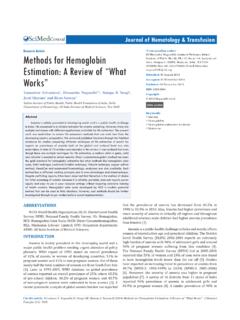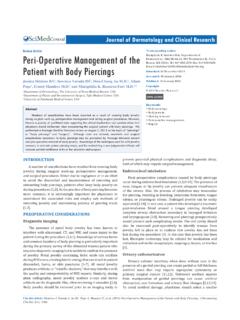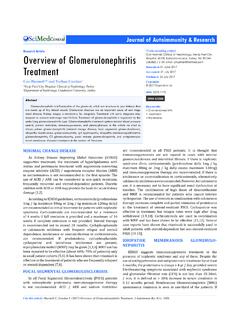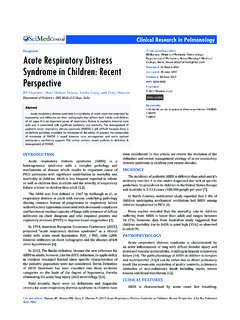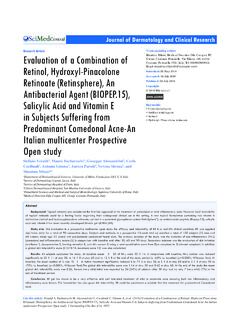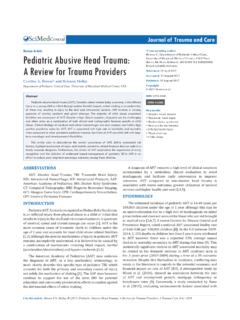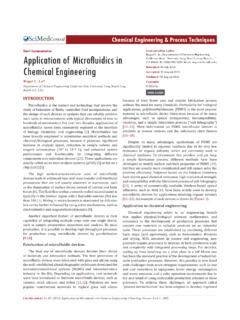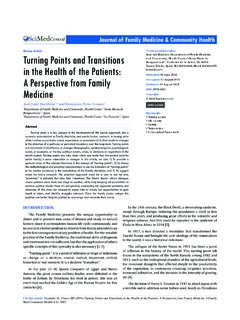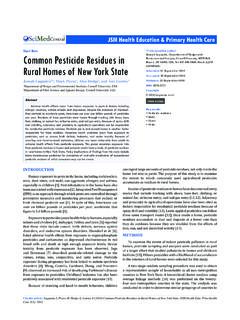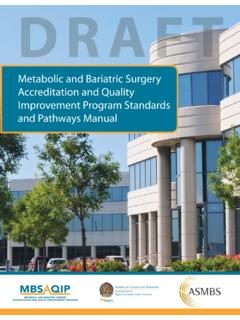Transcription of Eating Behavior Pre and Post Bariatric Surgery: Two Case ...
1 CentralBringing Excellence in Open Access Journal of Human Nutrition & Food ScienceCite this article: Bautista-D az ML, Alvarez-Ray n G, Mancilla-D az JM, Amaya-Hern ndez A, Ortega-Luyando M, et al. (2016) Eating Behavior Pre and post Bariatric surgery : Two Case Studies. J Hum Nutr Food Sci 4(1): 1080.*Corresponding authorMar a Leticia Bautista-D az, Department of Psychology, Eating Disorders Laboratory and Human Learning Laboratory, National Autonomous University of Mexico, Iztacala School of Higher Studies. Avenida de los Barrios #1, Los Reyes Iztacala, Tlalnepantla, Estado de M xico, 54090, M xico, Tel: 56-23-13-Submitted: 10 March 2016 Accepted: 05 April 2016 Published: 07 April 2016 ISSN: 2333-6706 Copyright 2016 Bautista-D az et al.
2 OPEN ACCESS Case Report Eating Behavior Pre and post Bariatric surgery : Two Case StudiesMar a Leticia Bautista-D az1,2,3*, Georgina Alvarez-Ray n2, Juan Manuel Mancilla-D az2, Adriana Amaya-Hern ndez2, Mayaro Ortega-Luyando2 and Horacio Olvera-Hern ndez41 Department of Psychology, National Autonomous University of Mexico, Mexico2 Eating Disorders Laboratory, National Autonomous University of Mexico, Mexico 3 Human Learning Laboratory, National Autonomous University of Mexico, Mexico 4 Hospital Regional 1 de Octubre, ISSSTE, Mexico AbstractThe aim of this study was to report two case studies with diagnosis of binge Eating disorder (BED) pre Bariatric surgery (BS). For this study two cases under gastric bypass surgery who met BED criteria were selected from a broader research.
3 Patients signed an informed consent and were assessed with the diagnostic interview for Eating disorders. Patients reported that during their childhood both were thin, they also used to played football, experienced body dissatisfaction, did not exercise constantly because of their body weight and both have involved in different dieting methods but all these strategies have worked temporarily, because they have gained more weight than they lose; even one of them was underwent gastric balloon procedure before BS. Thirty days post -BS, patients reached a weight-reduction range between 16 and 25 kg; However, three weeks post -BS, when postoperative dieting should be bland, both patients reported consuming solid and hypercaloric foods in response to stressful events.
4 The BS leads to a significant body-weight reduction since the first month, however, even though the amount and frequency of food consumption of post -BS patients did not meet the binge Eating criteria (DSM-5), there is evidence of loss of control over Eating , since the amount and quality ingested was higher than the recommended. We conclude that despite the digestive anatomical modification of the BS, the abnormal Eating Behavior remains. However, it will be necessary to evaluate these patients in long-term follow-up to corroborate these findings and to determine feeding intervention Morbid obesity Binge Eating disorder Loss of control: Bariatric surgeryINTRODUCTIONC urrently, it is more common to hear about Bariatric surgery (BS) or also identified as surgery for obesity, since it has been positioned as the only effective treatment for morbid obesity.
5 This procedure is indicated in patients with type III obesity (body mass index [BMI 40]), recurrent unsuccessful attempts to reduce weight, and important comorbidity [1-3]. Besides, it is worth mentioning that, BS is a therapeutic intervention, not an aesthetic strategy, because it involves changes in the functional anatomy of digestive system [l,4,5]. BS includes three different types of procedures: restrictive (reduced stomach capacity); absorptive (inducing malabsorption of food); or mixed (combination of the last two methods). Specifically, in the mixed procedure one technique has gained popularity the gastric bypass , which consists of reducing gastric capacity and shorten the length of intestines, reconnected with a bypass, leading to a significant weight loss.
6 So it is a permanent surgical treatment that must be followed by a lifetime change in feeding habits; specifically Eating small portions and consuming low-fat food to counteract malabsorption [6-8]. In general, results according to weight reduction post -BS indicate that it is an appropriate strategy for people with type III obesity; however up to 60% of cases does not reach the expected weight reduction [9-13]. In this regard, it has been hypothesized that one of the factors that may be affecting the weight reduction is the presence of binge Eating disorder (BED), which is characterized by the presence of at least one binge episode per week in the last three months, with no recurrent compensatory behaviors (self-induced vomiting, use of laxatives/diuretics, exercising, etc.)
7 [14]. Clearly the criteria of this disorder impact CentralBringing Excellence in Open Access Bautista-D az et al. (2016)Email: J Hum Nutr Food Sci 4(1): 1080 (2016) 2/6the body weight, so a psychological intervention aimed to Eating behaviors before BS may improve outcomes of weight researchers found that BS diminish the frequency and the amount of food intake in a binge Eating episode, suggesting an improved in the Eating Behavior [15-17], from our point of view, this could be due to the lack of gastric capacity. Besides it is worth to remember that BED is a bio-psycho-social disorder and the BS only addresses the biological dimension not the psycho-social. Contrary, other papers have reported that the surgery could trigger the binge Eating Behavior [18], in this case we assume that one reason might be that the disorder diagnosis prior surgery was not well identified.
8 Most of these findings15-20 have evaluated disordered Eating Behavior with a larger sample; nevertheless it is necessary to analyze specific cases diagnosed with BED since a clinical perspective is as relevant as the statistical one [15-20]. There are two methodological approaches for researching: one of them is the nomothetic which create laws or logical theories to explain the phenomena objectively, this route regularly is utilized for group analysis; this method is relevant to characterize populations and generalize findings; the second approach is the idiographic, which applies the laws or theories derived from the nomothetic and helps to understand, describe, explain or predict a phenomena considering the individual lives experiences [21,22].
9 In this manner, an idiographic approach provides a greater understanding and deepening of the Eating Behavior , not only from a biological dimension of the human being, but also about the mental and social health. Thus the aim of this paper was to report the case study of two male patients with BED pre-BS and to describe their Eating Behavior paper was part of a broader investigation with a pre-experimental-longitudinal design and prospective study which general objective was to derive an anthropometric and psychological profile of BS candidates and to assess post -BS changes [23]. The Research and Ethics Committees of each Health Institution approved the research protocol for this investigation.
10 Therefore, in compliance with the norms for patients treatment, there is the obligation to notify, when were the case the presence of any Eating disorder, not only to the patient but also to the physician in charge ( Bariatric surgeon), to referred the patient to specialization for this case report, from a total sample of 45 patients evaluated, were selected for convenience two patients, the reason for selecting them was that both cases met the diagnosis for BED according to the Diagnostic and Statistical Manual version 5 (DSM-5, APA, 2013) [14]. Both patients underwent gastric bypass surgery in a public tertiary care hospital located at the Metropolitan Area of Mexico City. To protect the identity of patients they will be identified as Pepe (Case 1) and Luis (Case 2).
